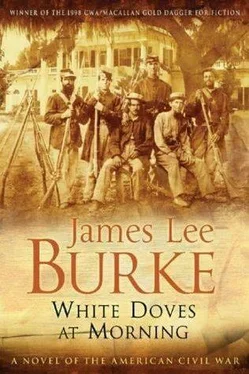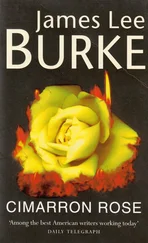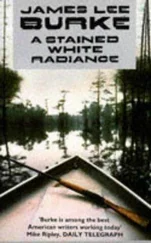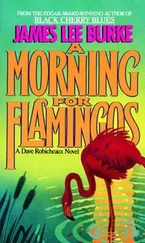"Search me," McCain said.
"Can I accept your word you're about to take them from our presence?"
"They're just boys having fun."
"I'll put it to you more simply. How would you like to catch a ball between your eyes?"
The wind had died and the air in the street had turned stale and close, stinking of horse and dog droppings, the lantern overhead iridescent with humidity. The joy in the revelers had died, too, as they watched their leader being systematically humiliated. McCain's horse shifted its weight and tossed its head against the reins. McCain brought his fist down between the animal's ears.
"Hold, you shithog!" he said.
"Give me your answer, sir," Robert said.
McCain cleared his throat and spit out into the street. He wiped his mouth.
"You've read for the law. I'm a merchant who doesn't have your verbal skills," he said. He turned his horse in a circle, its hindquarters and swishing tail causing Robert to step backward. Then McCain straightened his shoulders and pulled the creases out of his coat and said something under his breath.
"What? Say that again!" Robert said, starting forward.
But McCain kicked his heels into his horse's ribs and set off in a full gallop down the street, his legs clenched as tightly in the stirrups as a wood clothespin, one hand dipping inside his coat. He jerked the bit back in his horse's mouth, whirled in a circle, and bore down on Robert Perry, his bowler flying from his head, a nickel-plated, double-barrel derringer pointed straight out in front of him.
He popped off only one round, nailing the lantern on the pole dead center, blowing glass in a shower above Robert's head. He held up the derringer in triumph, the unfired barrel a silent testimony to the mercy he was extending an adversary.
The revelers roared with glee and vindication and climbed aboard their flatbed wagon, then followed their leader back down the street to a saloon. Robert picked a sliver of glass off his shirt and pitched it into the darkness.
"The word is he's a White Leaguer," Willie said.
"I don't think they're all cut out of the same cloth," Robert said.
Willie looked at Robert's profile, the uncut hair on the back of his neck, the clarity in his eyes. "How would you be knowing that?" he said.
"The carpetbaggers are pulling the nails out of our shoes. We don't always get to choose our bedfellows. Wake up, Willie," Robert replied.
"Oh, Robert, don't be taken in by these fellows. They do their deeds in darkness and dishonor our colors. Tell me you're not associating with that bunch."
But Robert did not reply. As Willie watched his friend walk inside the school to find Abigail Dowling, the sword wound in his shoulder seemed to flare as though someone had held a lighted match to his skin.
EACH morning Ira Jamison rose to greater prosperity and political expectations. Where others saw the collapse of a nation, he saw vast opportunity. He listened respectfully while his neighbors decried carpetbag venality and gave his money and support to the clandestine groups who spoke of retaking Louisiana from the Union, but in truth he viewed the carpetbaggers as cheaply dressed and poorly educated amateurs who could be bought for pocket change.
His summer days of 1865 began with a fine breakfast on his terrace, with an overview of the Mississippi and the trees and bluffs on the far side. He drank his coffee and read his newspapers and the mail that was delivered in a leather pouch from the plantation store. He subscribed to publications in New Orleans, Atlanta, New York, and Chicago, and read them all while a pink glow spread across the land and fresh convict labor throughout the state arrived by steamboat and jail wagon for processing in the camps and barracks they built themselves as the first down payment on their sentences.
Ira Jamison wondered if Abe Lincoln, moldering in the grave, had any idea what he had done for Ira Jamison when he emancipated the slaves…
Then he unwrapped the current issue of Harper's Weekly, read the lead stories, and turned to the second page. At the top of a four-column essay were the words:
The Resurrection of a Vanquished Enemy? The Negro as Convict in the New South, A View by Our Louisiana Correspondent
Jamison set down his coffee cup and began reading.
Even the apologists for Jefferson Davis would concede he spent a political lifetime attempting to spread slavery throughout the Western territories as well as the Caribbean. His close friend Confederate General Nathan Bedford Forrest has recently tried to influence congressional legislation that would bring about the importation of one million Cantonese coulees to the United States as a source of post-Emancipation labor.
However, an ex-Confederate colonel by the name of Ira Jamison, who has converted his central Louisiana plantation into an enormous prison, may have come upon a profit-making scheme in the exploitation of African labor that outrivals any precedent his peers may have set.
Mr. Jamison rents convicts to enterprises and businessmen whose vested interest is to keep costs low and productivity high. The reports of beatings, malnutrition, and deaths from exhaustion and exposure to inclement weather are widespread.
Mr. Jamison, who prefers to be called 'Colonel,' is a wounded veteran of Shiloh. But his name has also been associated with the destruction of the 18th Louisiana Infantry, who were sent uphill into Union artillery and were unsupported on the flank by the unit under Mr. Jamison's command-
The name on the byline was Abigail Dowling.
Ira Jamison rolled the journal into a tight cylinder and walked into the house, tapping it on his leg, puffing air in one cheek, then the other, conscious each moment of the anger she could stir in him, the control he had to muster not to let it show in his face. He stood by his fireplace, tapping the cusp of the Journal against the bricks, looking out the window at the brilliance of the day. Then, like a man who could not refrain from picking at a scab, his eye wandered to the fissure that cut across his hearth and climbed up one side of his chimney. Had it grown wider? Why was he looking at it now?
He took a lucifer match from a vase on the mantel and scratched it alight, then touched the flame to the rolled edges of the journal and watched the paper blacken along one side of the cylinder. He dropped the pages like burning leaves on top of the andirons.
He sent his body servant to find both Clay Hatcher and Rufus Atkins. A half hour later they tethered their horses in the backyard and walked into the shade of the porte cochere and knocked on the side door. He did not invite them in and instead stepped outside and motioned for them to follow him to the terrace, where his uneaten breakfast still sat, buzzing with flies.
"One of the niggers serve you spoiled food, Kunnel? Tell us which one," Hatcher said.
"Shut up, Clay," Rufus Atkins said.
Jamison stood on the flagstones of the terrace, his fists propped on his hips, his head lowered in thought. The green boughs and bright red bloom of a mimosa tree feathered in the wind above the three men.
"I understand Abigail Dowling has started up a school for freed slaves," Jamison said.
"She ain't the only one. Flower is teaching there, too," Hatcher said.
Atkins gave Hatcher a heated look.
"Flower?" Jamison said.
"Damn right. Teaching reading and writing and arithmetic. Can you believe hit?" Hatcher said.
"Who put up the money for the school?" Jamison said.
"I hear she got hit from the woman runs the whorehouse," Hatcher said.
"Who is she?" Jamison asked.
Hatcher started to speak, but Atkins cut him off.
"Abigail Dowling got the money from Carrie LaRose, Colonel," Atkins said. "Is there something you want done?"
Читать дальше












